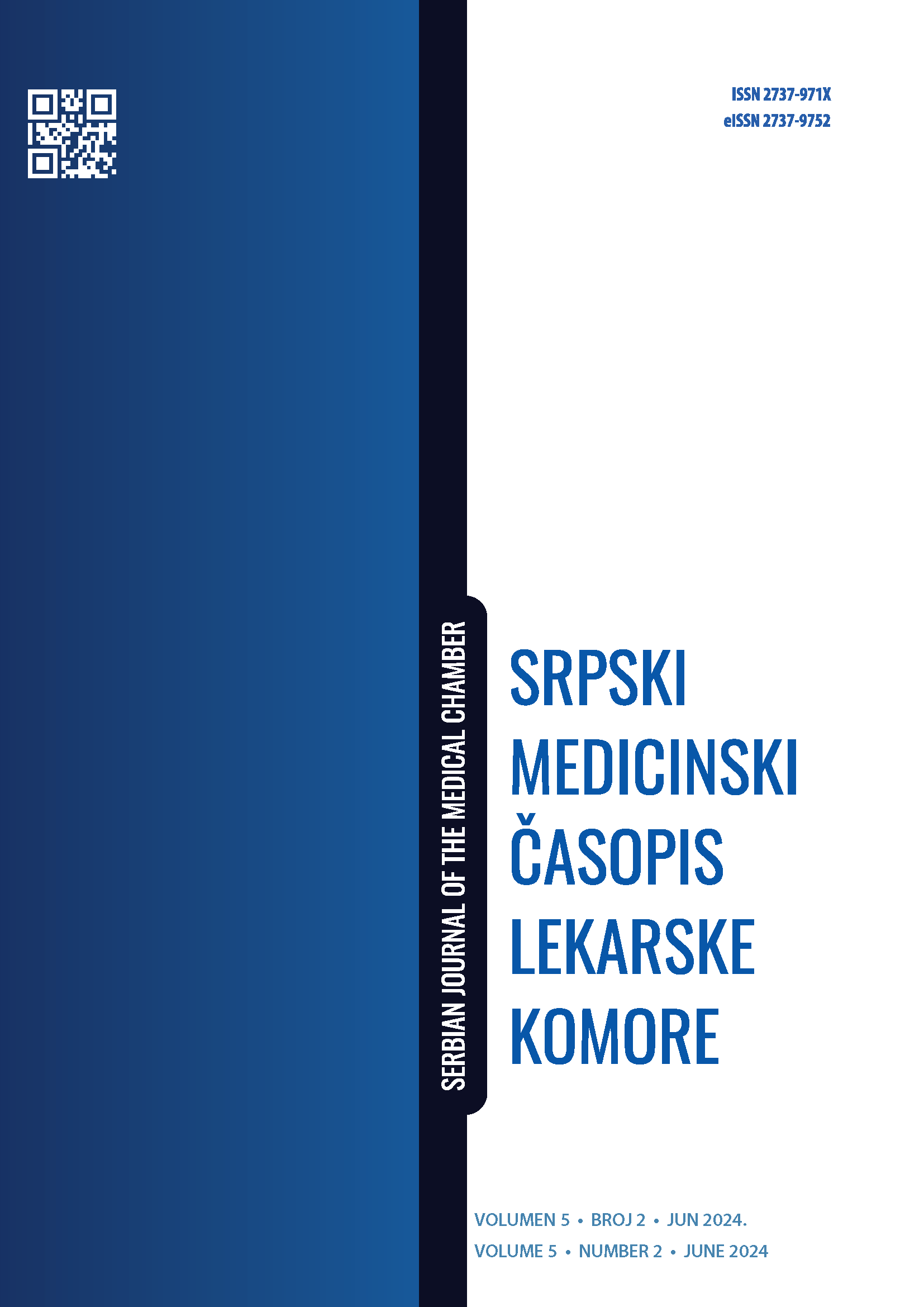PRIMENA INTRANAZALNOG ESKETAMINA U TRETMANU TERAPO-REZISTENTNE DEPRESIJE: PRIKAZ SLUČAJA
Sažetak
Uvod: Terapo-rezistentna depresija (TRD) je pojam koji označava depresivnu epizodu u okviru koje nije došlo terapijskog odgovora na primenu dva antidepresiva. Farmakološke strategije lečenja TRD uključuju složen postupak, sa mogućnostima primene više različitih psihofarmaka i u osnovi podrazumevaju: (1) zamenu/optimizaciju doze antidepresiva, ili (2) augmentaciju antidepresivne terapije. U okviru strategije augmentacije, značajno mesto zauzimaju NMDA antagonisti, u koje se ubraja i intranazalni esketamin. Dosadašnja istraživanja ukazuju da aplikacija intranazalnog esketamina kao augmentacionog agensa predstavlja efikasnu farmakološku strategiju u tretmanu TRD.
Prikaz slučaja: U ovom radu prikazujemo uspešnu primenu intranazalnog esketamina u koadministraciji sa inhibitorom ponovnog preuzimanja serotonina/noradrenalina (SNRI antidepresiva) kod pacijenta sa TRD.
Zaključak: Neophodna su dalja istraživanja u cilju boljeg razumevanja mehanizma delovanja, načina doziranja, kao i dugoročnih ishoda i bezbednosnog profila ovog pristupa.
Reference
Herrman H, Kieling C, McGorry P, Horton R, Sargent J, Patel V. Reducing the global burden of depression: a Lancet–World Psychiatric Association Commission. Lancet. 2019;393(10189):e42-3. doi: 10.1016/S0140-6736(18)32408-5.
Marić NP, Mihić LJ, Lazarević LB, Knežević G. Probable depression and anxiety in seven European countries during the COVID-19: probable overestimation of the problem due to sampling method. J Affect Disord. 2022;311:554-55. doi: 10.1016/j.jad.2022.05.119.
Thornicroft G, Chatterji S, Evans-Lacko S, Gruber M, Sampson N, Aguilar-Gaxiola S, et al. Undertreatment of people with major depressive disorder in 21 countries. Br J Psychiatry. 2017;210(2):119-24. doi: 10.1192/bjp.bp.116.188078.
Kennedy SH, Lam RW, McIntyre RS, Tourjman SV, Bhat V, Blier P, et al. Canadian Network for Mood and Anxiety Treatments (CANMAT) 2016 clinical guidelines for the management of adults with major depressive disorder: section 3. Pharmacological treatments. Can J Psychiatry. 2016;61(9):540-60. doi: 10.1177/0706743716659417.
Bauer M, Severus E, Köhler S, Whybrow PC, Angst J, Möller H-J, et al. World Federation of Societies of Biological Psychiatry (WFSBP) guidelines for biological treatment of unipolar depressive disorders. part 2: maintenance treatment of major depressive disorder-update 2015. World J Biol Psychiatry. 2015;16(2):76-95. doi: 10.3109/15622975.2014.1001786.
McIntyre RS, Alsuwaidan M, Baune BT, Berk M, Demyttenaere K, Goldberg JF, et al. Treatment‐resistant depression: definition, prevalence, detection, management, and investigational interventions. World Psychiatry. 2023;22(3):394-412. doi: 10.1002/wps.21120.
Gaynes BN, Lux L, Gartlehner G, Asher G, Forman‐Hoffman V, Green J, et al. Defining treatment‐resistant depression. Depress Anxiety. 2020;37(2):134-45. doi: 10.1002/da.22968.
Souery D, Papakostas GI, Trivedi MH. Treatment-resistant depression. J Clin Psychiatry. 2006;67:16-22.
European Medicines Agency. Clinical investigation of medicinal products in the treatment of depression – Scientific guideline. 2018.
U.S. Food and Drug Administration. Major depressive disorder: Developing drugs for treatment. 2018.
Jerotić S, Ivković M. Pharmacological treatment of treatment-resistant depression: towards evidence-based recommendations. Med istraživanja. 2024;57(1):59-66. doi: 10.5937/medi57-48086.
Sapkota A, Khurshid H, Qureshi IA, Jahan N, Went TR, Sultan W, et al. Efficacy and safety of intranasal esketamine in treatment-resistant depression in adults: a systematic review. Cureus. 2021;13(8):e17352. doi: 10.7759/cureus.17352.
Buchmayer F, Kasper S. Overcoming the myths of esketamine administration: different and not difficult. Front Psychiatry. 2023;14:1279657. doi: 10.3389/fpsyt.2023.1279657.
Popova V, Daly EJ, Trivedi M, Cooper K, Lane R, Lim P, et al. Efficacy and safety of flexibly dosed esketamine nasal spray combined with a newly initiated oral antidepressant in treatment-resistant depression: a randomized double-blind active-controlled study. Am J Psychiatry. 2019;176(6):428-38. doi: 10.1176/appi.ajp.2019.19020172.
Hock RS, Feeney A, Iovieno N, Murrough JW, Mathew SJ, Iosifescu DV, et al. Rapidity of symptom improvement with intranasal esketamine for major depressive disorder: a systematic review and meta-analysis. J Clin Psychiatry. 2022;84(1):21r14086. doi: 10.4088/JCP.21r14086.
Jawad MY, Di Vincenzo JD, Ceban F, Jaberi S, Lui LMW, Gillissie ES, et al. The efficacy and safety of adjunctive intranasal esketamine treatment in major depressive disorder: a systematic review and meta-analysis. Expert Opin Drug Saf. 2022;21(6):841-52. doi: 10.1080/14740338.2022.2058488.
Kryst J, Kawalec P, Pilc A. Efficacy and safety of intranasal esketamine for the treatment of major depressive disorder. Expert Opin Pharmacother. 2020;21(1):9-20. doi: 10.1080/14656566.2019.1683161.
Mihajlović G, Vojvodić P, Vojvodić J, Andonov A, Hinić D. Validation of the Montgomery-Åsberg depression rating scale in depressed patients in Serbia. Srp Arh Celok Lek. 2021;149(5-6):316-21. doi: 10.2298/SARH200401004M.
Bergfeld IO, Mantione M, Figee M, Schuurman PR, Lok A, Denys D. Treatment-resistant depression and suicidality. J Affect Disord. 2018;235:362-7. doi: 10.1016/j.jad.2018.04.016.
Daly EJ, Singh JB, Fedgchin M, Cooper K, Lim P, Shelton RC, et al. Efficacy and safety of intranasal esketamine adjunctive to oral antidepressant therapy in treatment-resistant depression: a randomized clinical trial. JAMA Psychiatry. 2018;75(2):139-48. doi: 10.1001/jamapsychiatry.2017.3739.
Sanders B, Brula AQ. Intranasal esketamine: From origins to future implications in treatment-resistant depression. J Psychiatr Res. 2021;137:29-35. doi: 10.1016/j.jpsychires.2021.02.020.
Liu P, Zhang S-S, Liang Y, Gao Z-J, Gao W, Dong B-H. Efficacy and safety of esketamine combined with antidepressants for treatment-resistant depression: a meta-analysis. Neuropsychiatr Dis Treat. 2022;2855-65. doi: 10.2147/NDT.S388764.

